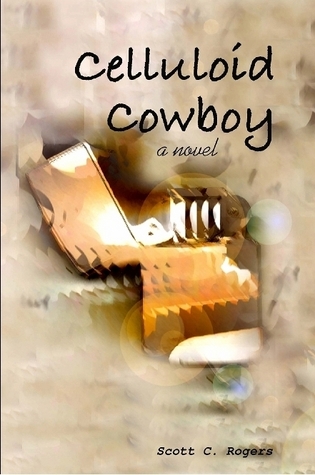 There is a lot of new fiction that’s heavily influenced by Charles Bukowski. The U.K. group of writers The Brutalists fits this mold. In the U.S., the Long Beach, CA press Burning Shore puts out Bukowski-inspired work by Tony O’Neill (also a member of the Brutalists), Dan Fante (son of Bukowski mentor John Fante), and Rob Woodard. Mark SaFranko, author of Hating Olivia, is another writer to send into this mix.
There is a lot of new fiction that’s heavily influenced by Charles Bukowski. The U.K. group of writers The Brutalists fits this mold. In the U.S., the Long Beach, CA press Burning Shore puts out Bukowski-inspired work by Tony O’Neill (also a member of the Brutalists), Dan Fante (son of Bukowski mentor John Fante), and Rob Woodard. Mark SaFranko, author of Hating Olivia, is another writer to send into this mix.
And now add another writer: Scott Rogers, author of Celluloid Cowboy. So much so that his small press is called Black Coffee Press, which has echoes of Bukowski’s Black Sparrow Press. At the same time, there is a unifying theme in the writers listed above. They are all writing from life. Tony O’Neill writes about his harrowing time as a heroin addict. SaFranko writes about his time in a string of bad jobs and bad relationships. With all of those writers, you get the sense that it’s happening as you’re reading it. That’s the sense you get with Bukowski as well: that you’re living through what he’s living through. With Rogers’ novel, you get the sense that he’s writing something he wished had happened.
That’s a big difference in hard-edged, first-person writing. You get the sense sometimes that Rogers is trying to seem tough and this is nothing like his actual life. I could be wrong on that, but that’s how it reads. So when he’s sleeping with a girl, a midget comes in wielding a samurai sword and chases him away. A funny image, maybe, but impossible. From page 35, a fight with his boss:
He suddenly makes a leap and comes charging down the dock plate. I step back, throw my hands up and cock my head like Bruce Lee. He’s still charging. Fuck, I need an elephant gun, but all I spot is the shovel by the side of the dock plate. I grab it and wield it like Thor with Eleanor. It connects right across his left knee.
He falls like a Christmas tree.
If this was Bukowski, he’d lose the fight. Same goes with Jim Thompson’s characters. Same goes with Tony O’Neill, for that matter – he’s losing the fight with heroin. But in this book, the character is every step a badass. Again, could be wrong, but I have a feeling the writer’s never hit his boss with a shovel.
And then there’s this issue. The character in the book frequently uses the n-word. I’m not overly PC, normally, but when the word is thrown into a book, it needs to have some purpose. Celluloid Cowboy isn’t the portrait of a racist, it’s a portrait of someone who’s supposed to seem tough and kind of cool. And so when he throws in racist word, it makes it seem like the book itself is racist – as if it’s cool to be racist – not the character, because he’s throwing around that word with no basis. If in one section we’re supposed to be howling with laughter that he beats up his employer and the next he’s being racist, what’s the book trying to signify?
You know, saying the book is racist might have people automatically not give the book another look, but really this is to point out the book’s central flaw: that the protagonist (and the writer) is trying far too hard to sound tough, saying fuck a lot, beating people up, that it comes off as too tough by half. Even so, there is a lot of good writing in this – Bukowski-caliber good writing. For real. And maybe now the writer’s got this kind of book out of his system.
Generally, I don’t actually agree with the sentiment, “Write what you know.” I’d throw in there as well, “Write what you want to know.” But in this book “Write what you know” actually comes into play because the writer is spending a bit too much time writing a character he wishes he was than he actually is. When you’re writing the tough-guy narrative who doesn’t have a unique job, like private investigator, and is just your garden-variety slacker, who happens to get into fights with midgets, his friends get killed, he’s sleeping with a seventeen-year-old, and so on, it just seems like wish fulfillment. As a reader, you never feel like your walking in the guy’s shoes because these things never did – and never could – happen. Not within the confines of one week’s time, which is how the book unfolds.
You could make an argument that it’s Lynchian – weird, absurd stuff hits out of the blue. But given that the prose owes a lot more to Bukowski than David Lynch, that argument’s not going to fly. You could also make the argument that it’s Tarantino-esque – larger than life violence. But Tarantino writes almost comic-book style characters (“Kill Bill”), and this book is trying to hold to some kind of slacker reality.
Put that all together and Scott Rogers is a very interesting writer who didn’t hit the mark with this book. Mind you, it’s entertaining, it’s funny, it’s got good images, but plausibility is important, especially when the lead character’s voice is supposed to be so bare bones and down to earth.
Get an Editorial Review | Get Amazon Sales & Reviews | Get Edited | Get Beta Readers | Enter the SPR Book Awards | Other Marketing Services






















Leave A Comment